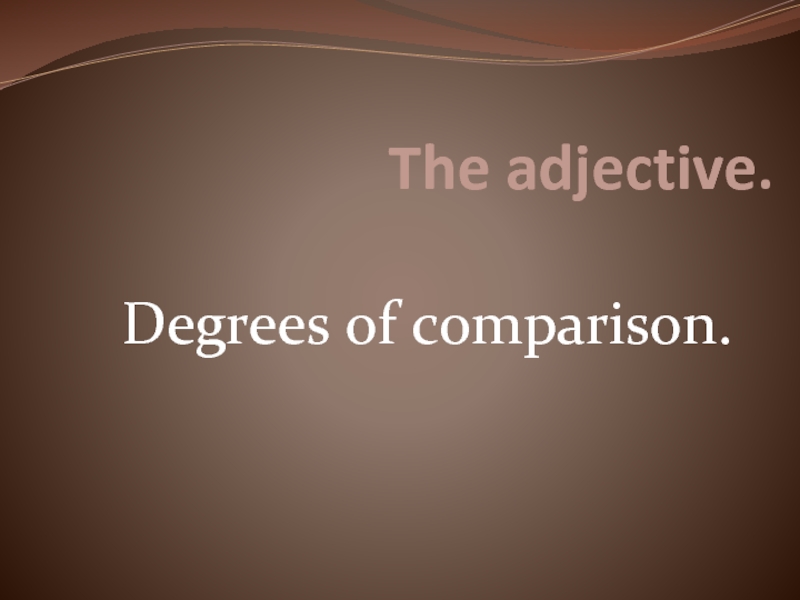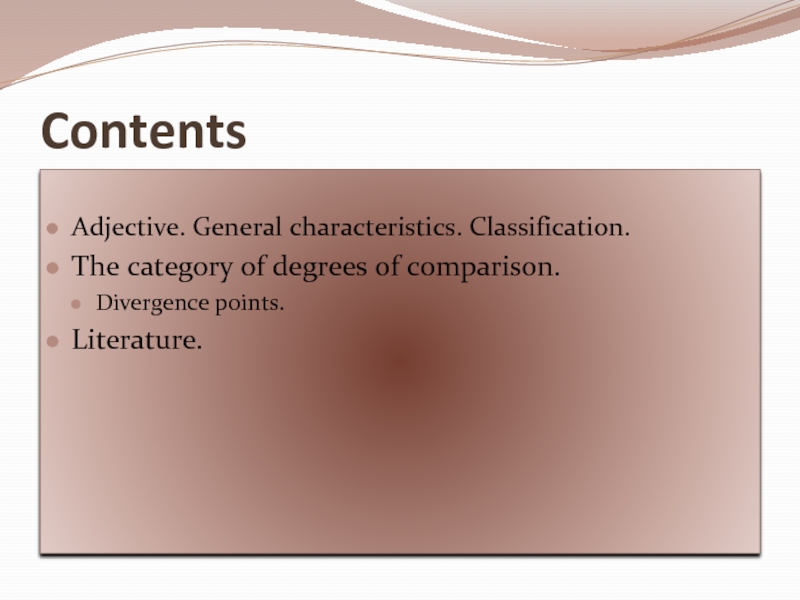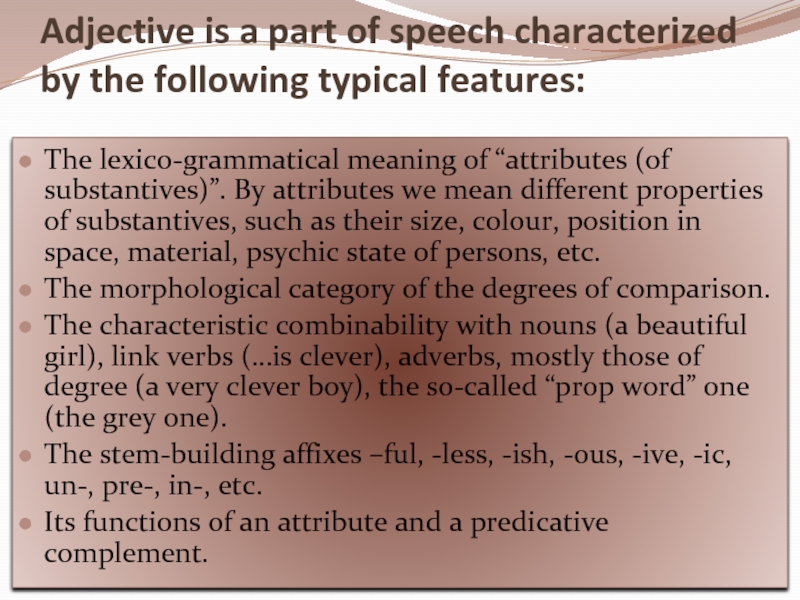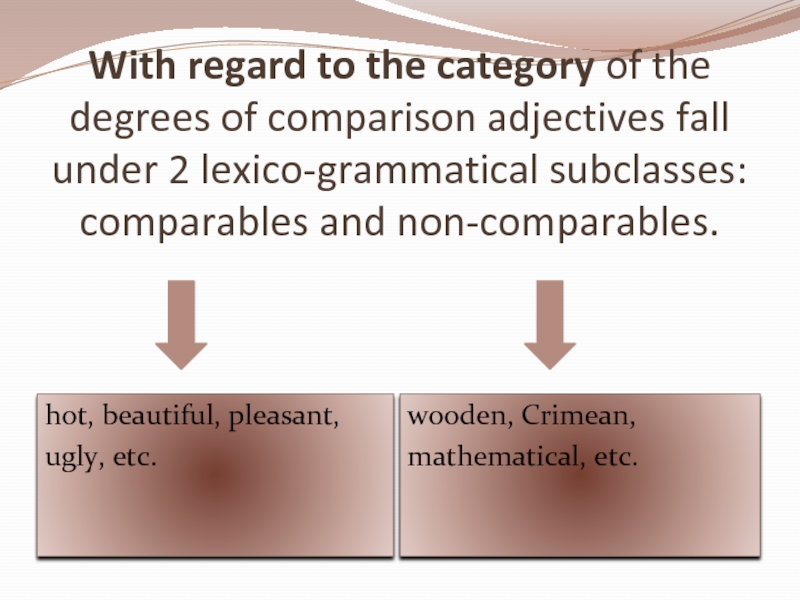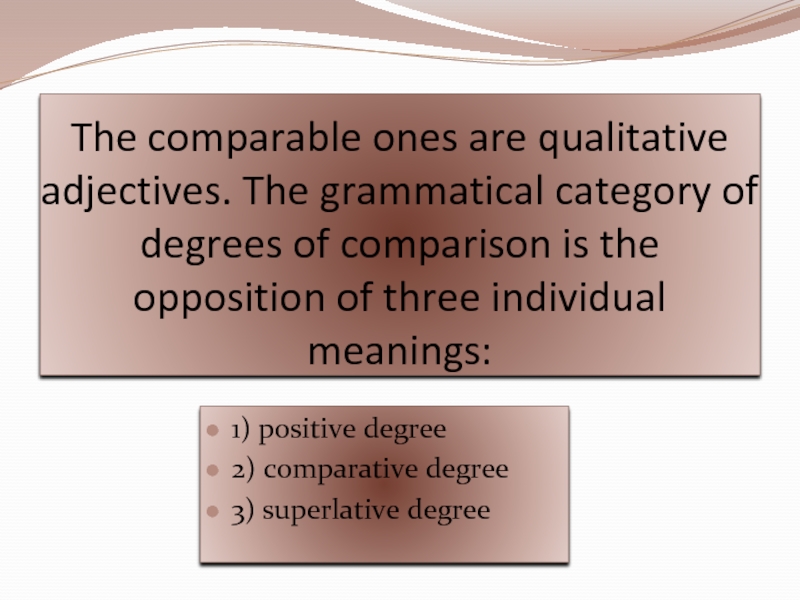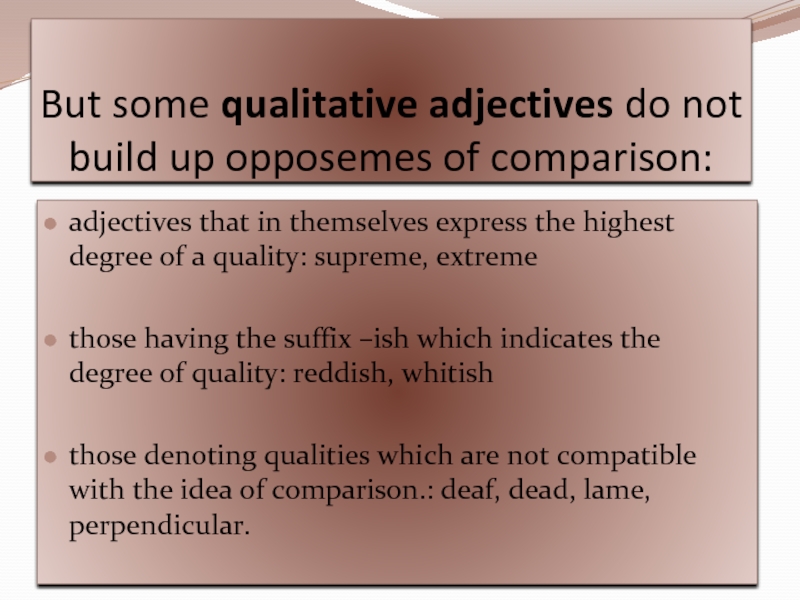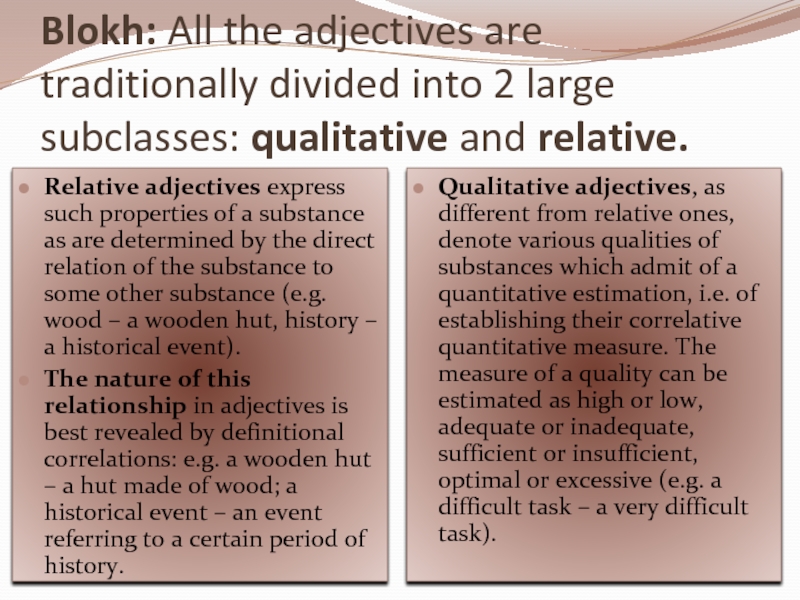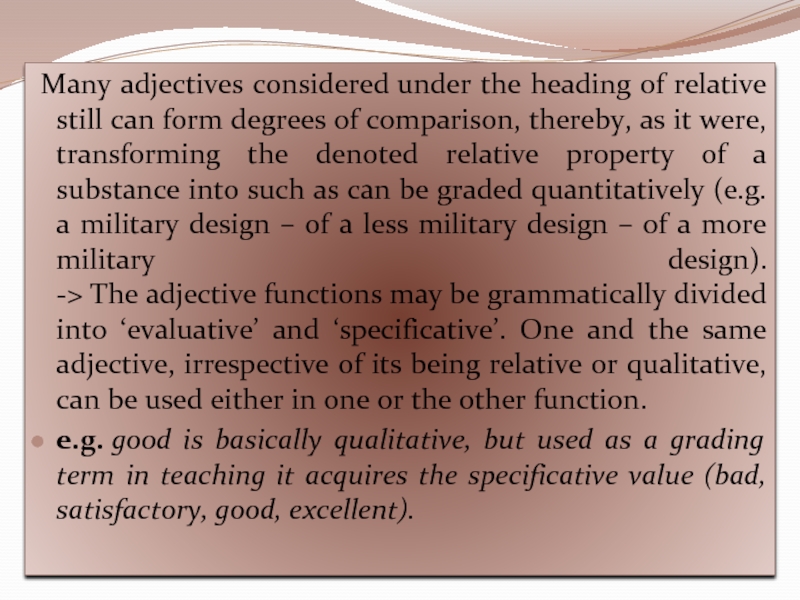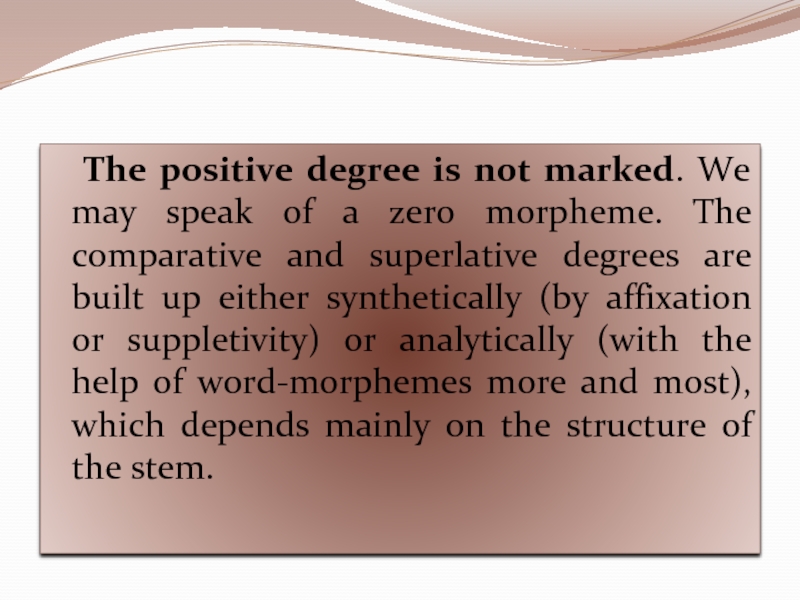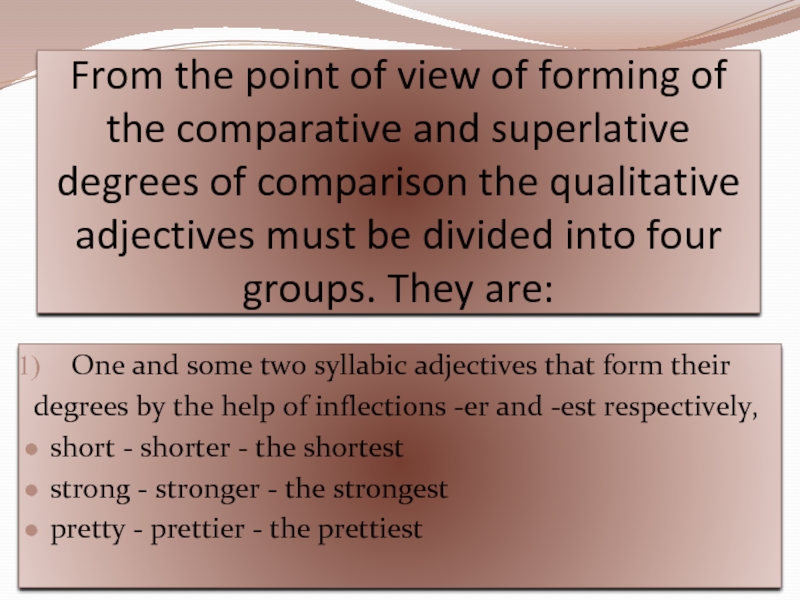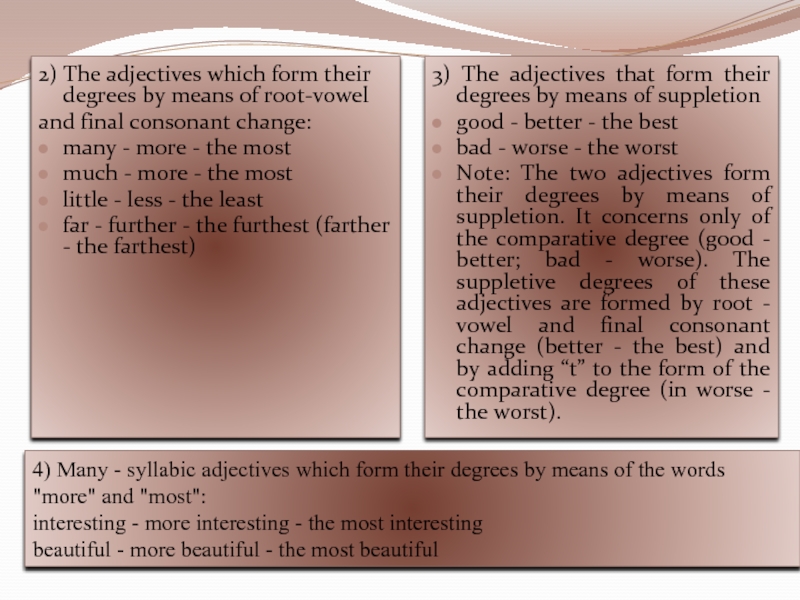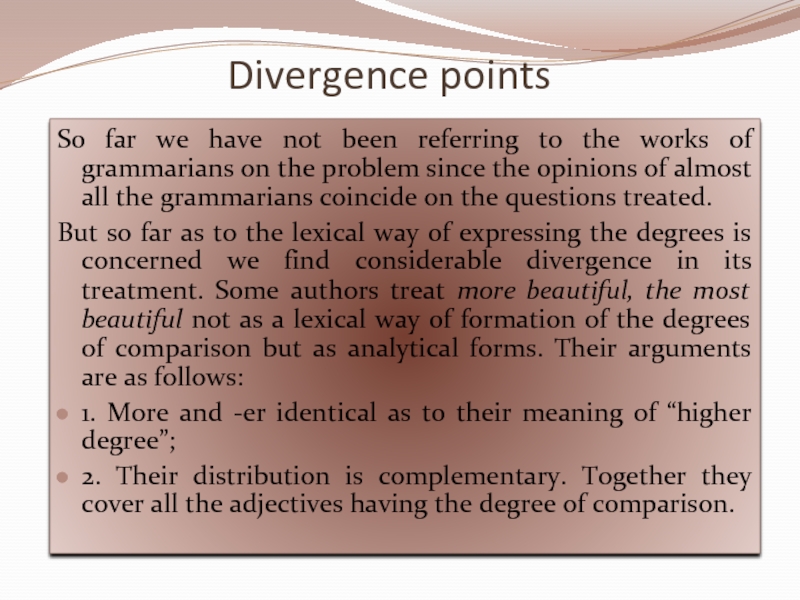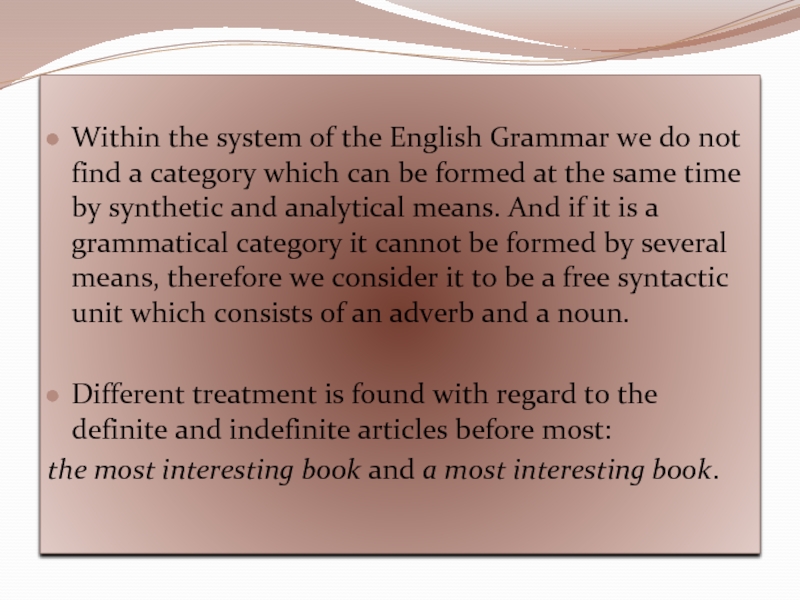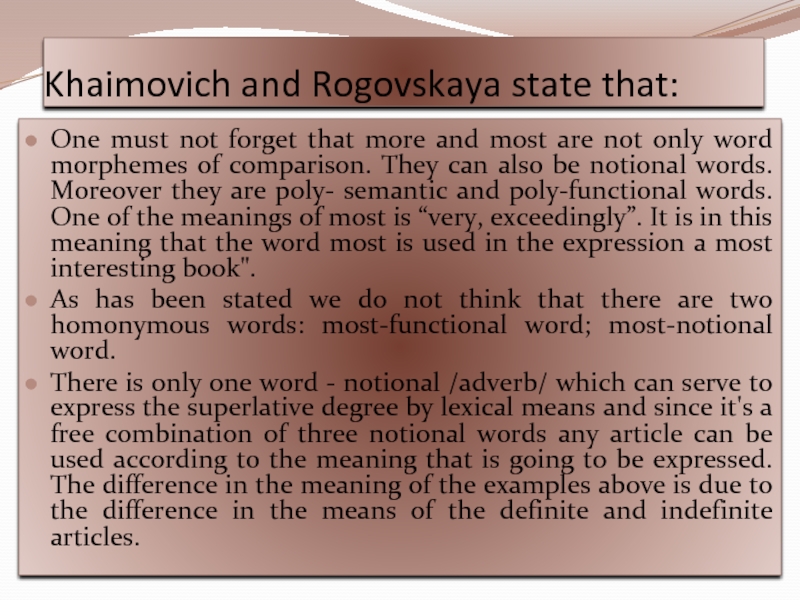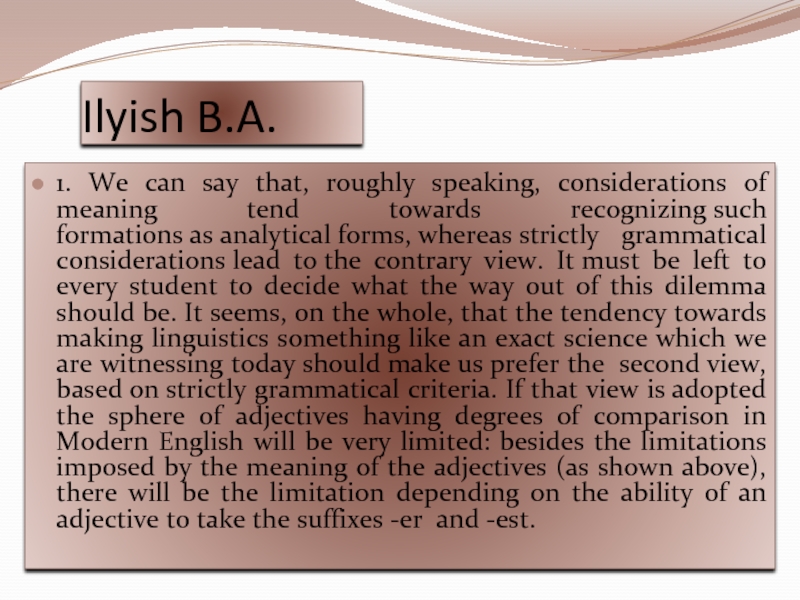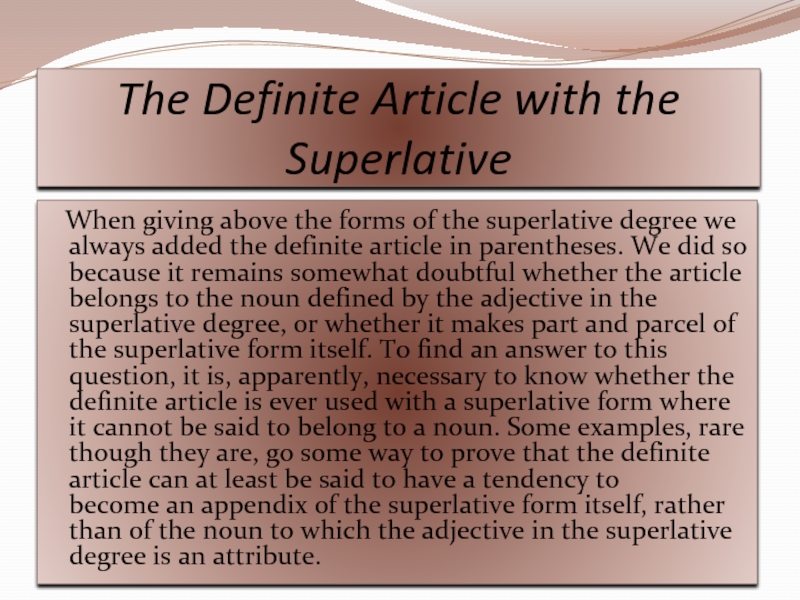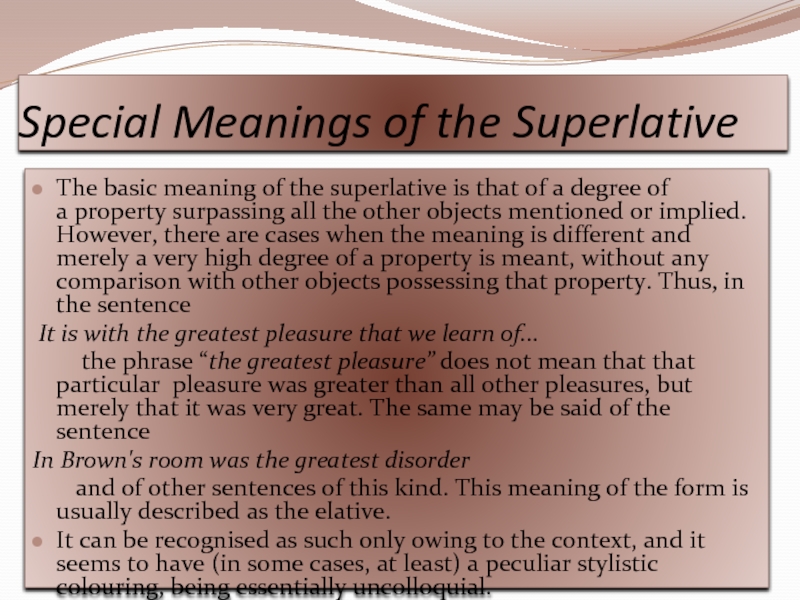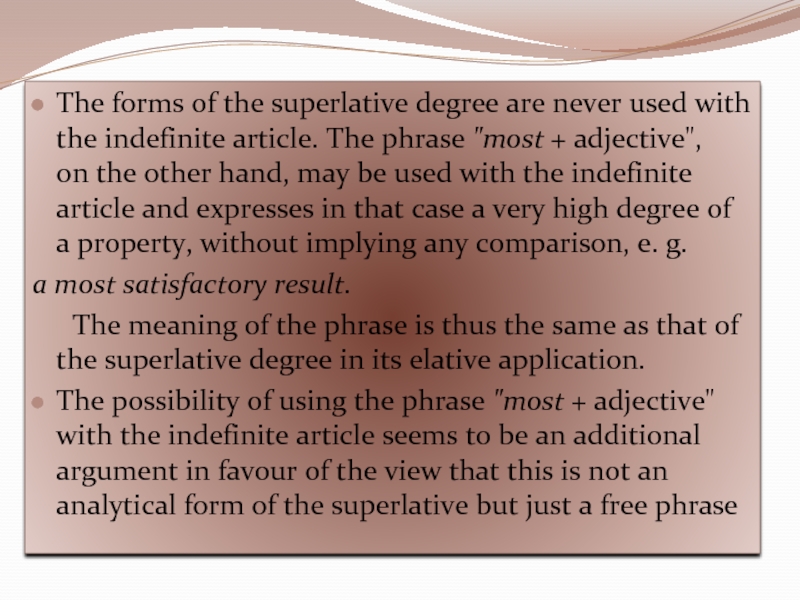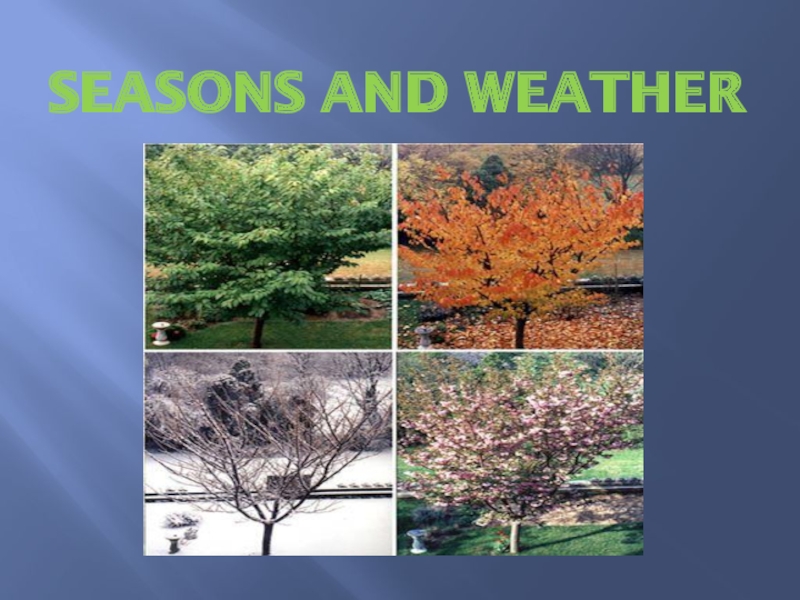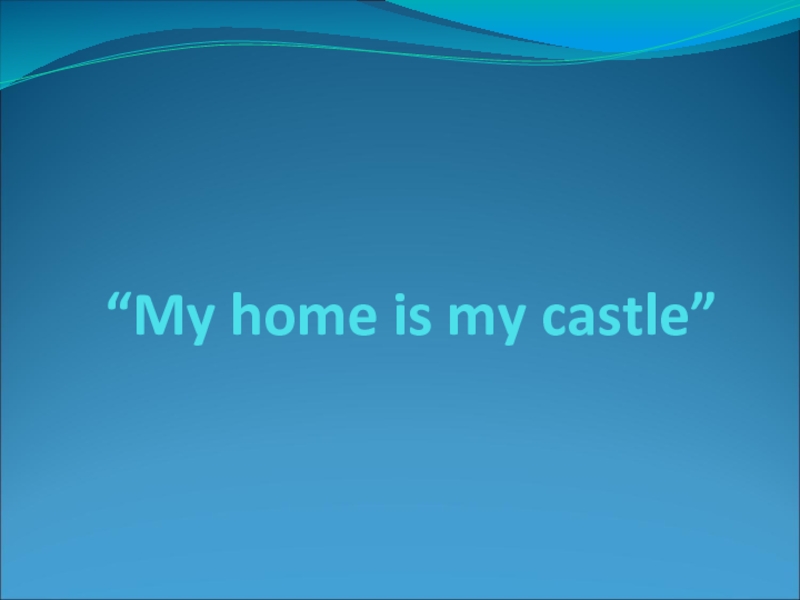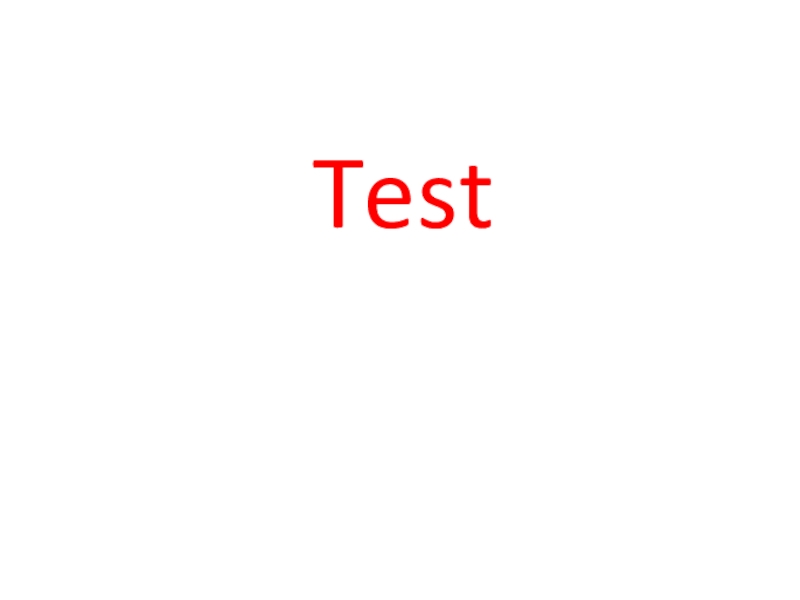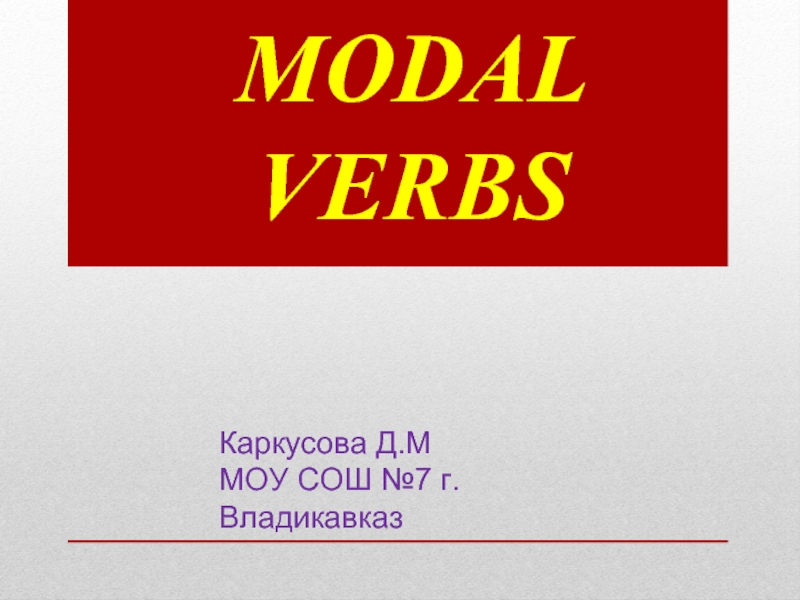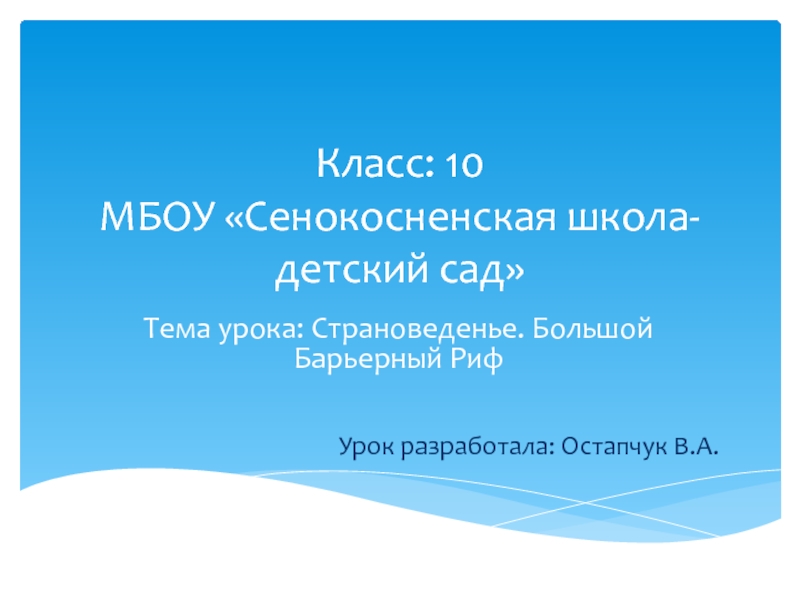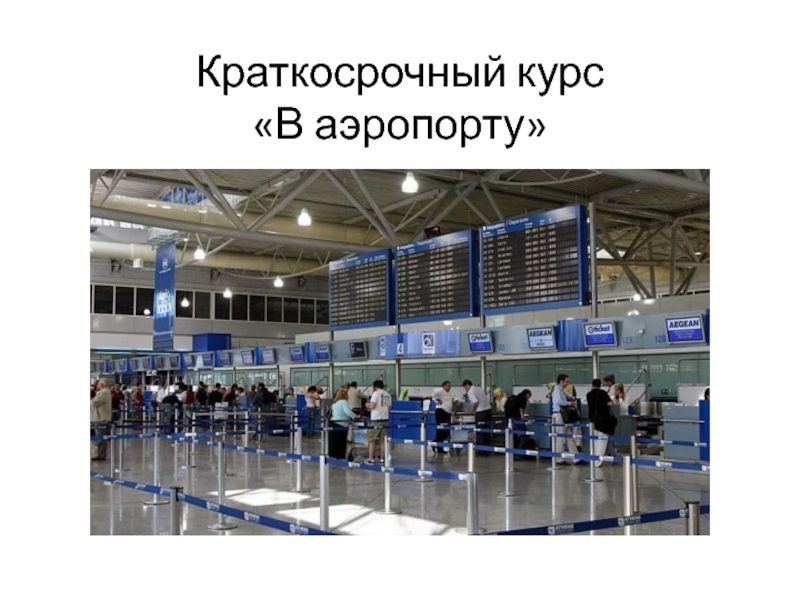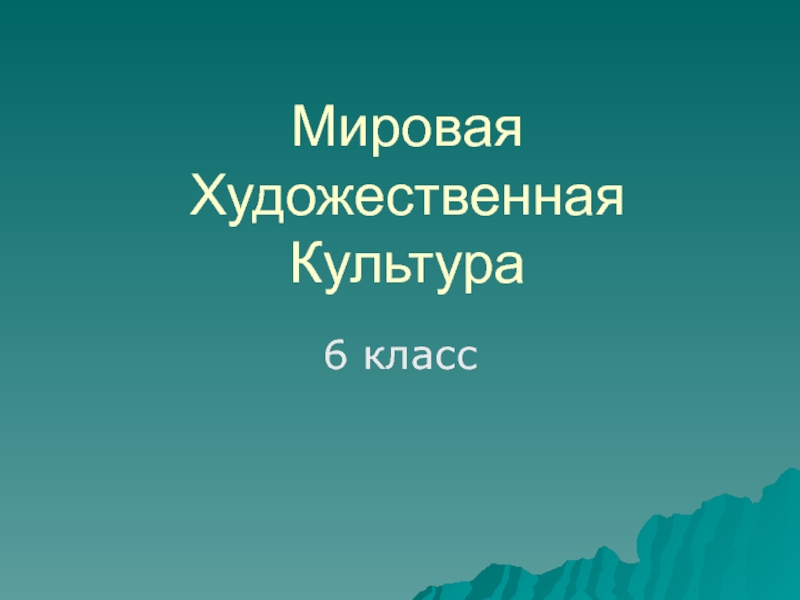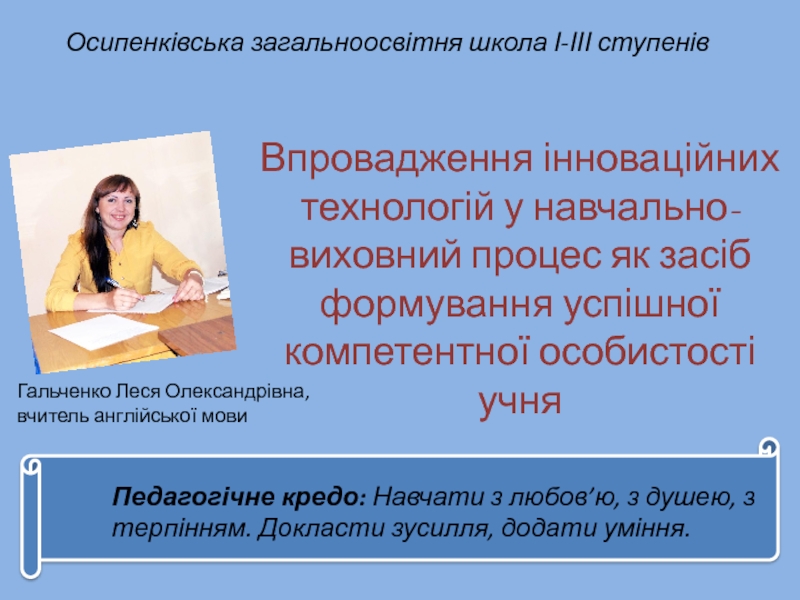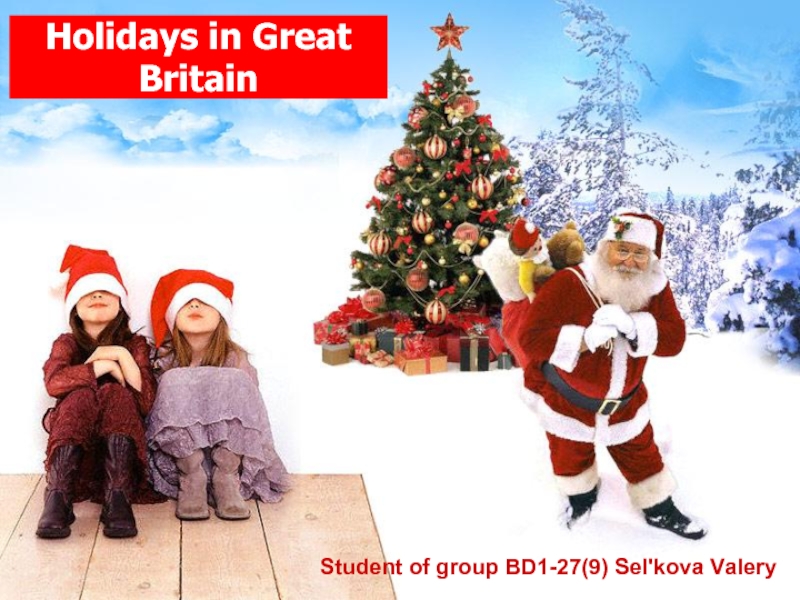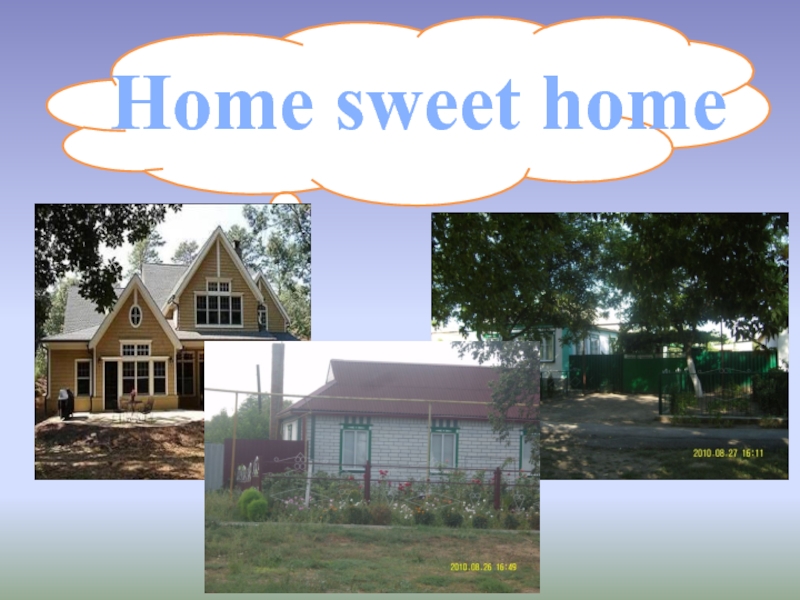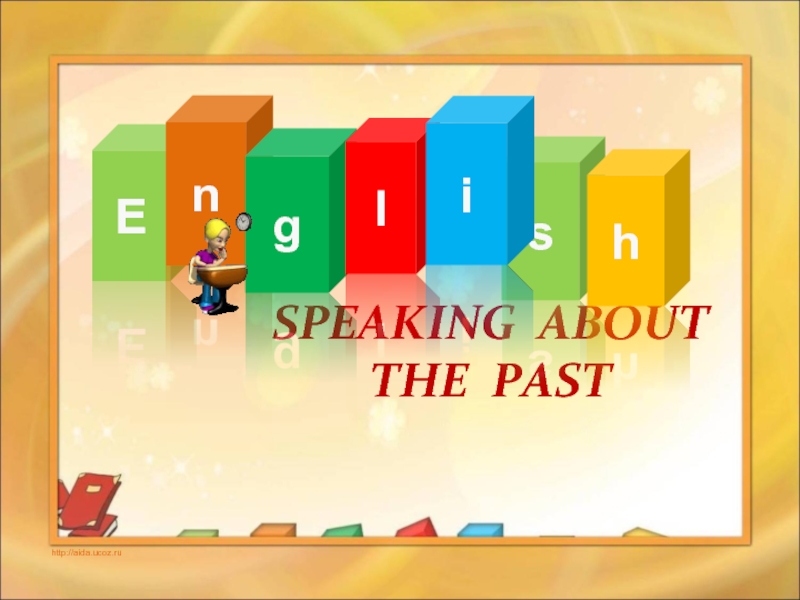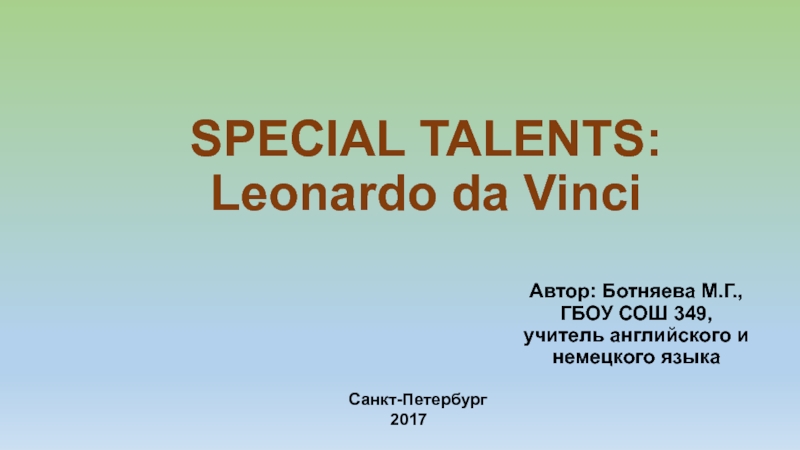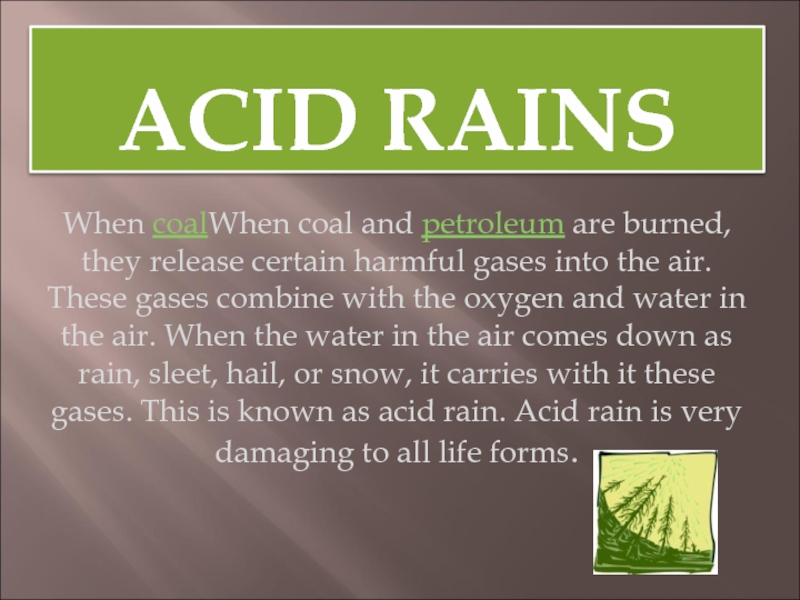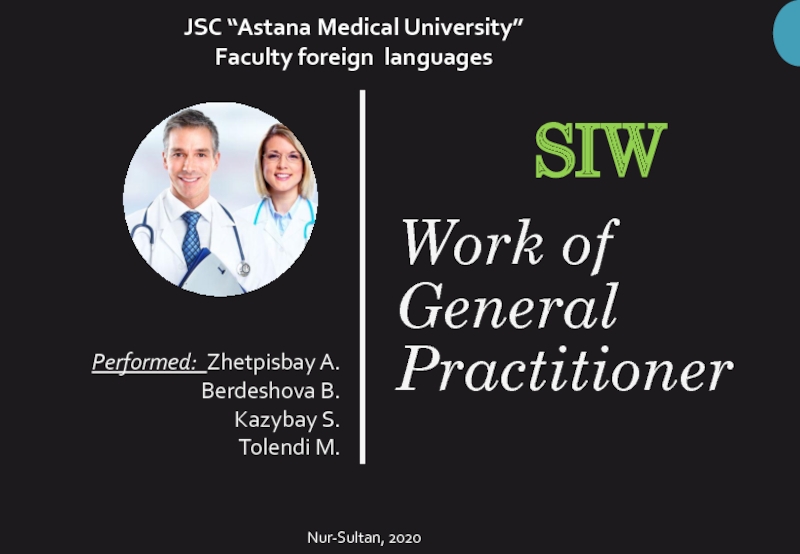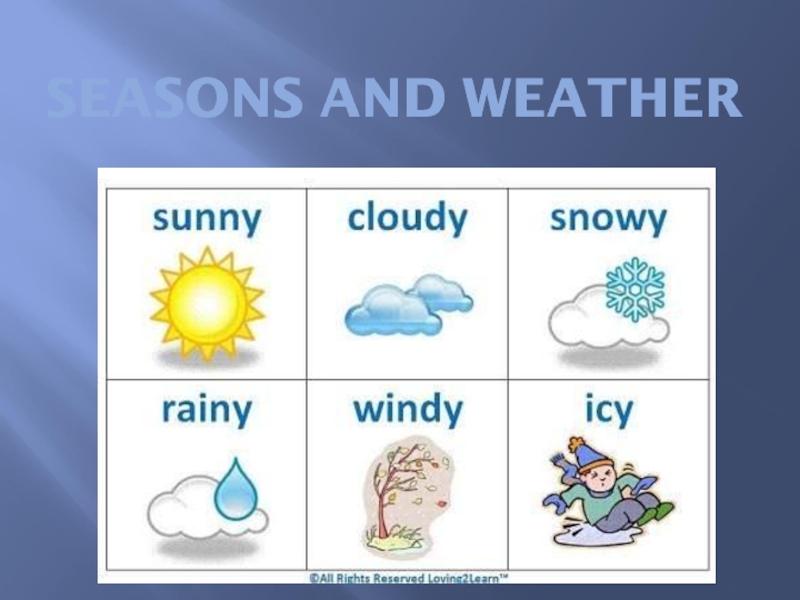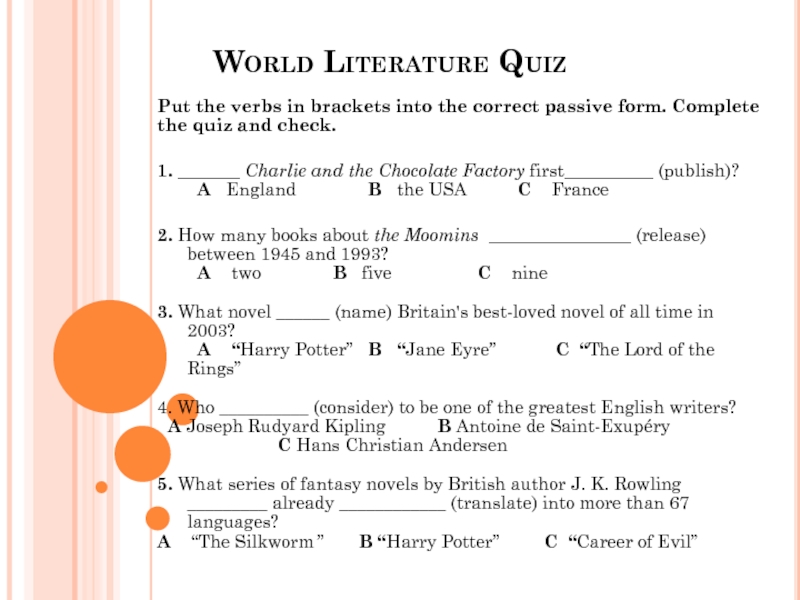Слайд 1The adjective.
Degrees of comparison.
Слайд 2Contents
Adjective. General characteristics. Classification.
The category of degrees of comparison.
Divergence points.
Literature.
Слайд 3Adjective is a part of speech characterized by the following
typical features:
The lexico-grammatical meaning of “attributes (of substantives)”. By attributes
we mean different properties of substantives, such as their size, colour, position in space, material, psychic state of persons, etc.
The morphological category of the degrees of comparison.
The characteristic combinability with nouns (a beautiful girl), link verbs (…is clever), adverbs, mostly those of degree (a very clever boy), the so-called “prop word” one (the grey one).
The stem-building affixes –ful, -less, -ish, -ous, -ive, -ic, un-, pre-, in-, etc.
Its functions of an attribute and a predicative complement.
Слайд 4Classification of adjectives.
Blokh says: ”The adjective expresses the categorial semantics of
property of a substance аnd each adjective used in text
presupposes relation to some noun. Unlike nouns, adjectives do not possess a full nominative value”.
Слайд 5With regard to the category of the degrees of comparison adjectives
fall under 2 lexico-grammatical subclasses: comparables and non-comparables.
hot, beautiful,
pleasant,
ugly, etc.
wooden, Crimean,
mathematical, etc.
Слайд 6The comparable ones are qualitative adjectives. The grammatical category of
degrees of comparison is the opposition of three individual meanings:
1)
positive degree
2) comparative degree
3) superlative degree
Слайд 7But some qualitative adjectives do not build up opposemes of
comparison:
adjectives that in themselves express the highest degree of a
quality: supreme, extreme
those having the suffix –ish which indicates the degree of quality: reddish, whitish
those denoting qualities which are not compatible with the idea of comparison.: deaf, dead, lame, perpendicular.
Слайд 8Blokh: All the adjectives are traditionally divided into 2 large subclasses: qualitative and relative.
Relative
adjectives express such properties of a substance as are determined by
the direct relation of the substance to some other substance (e.g. wood – a wooden hut, history – a historical event).
The nature of this relationship in adjectives is best revealed by definitional correlations: e.g. a wooden hut – a hut made of wood; a historical event – an event referring to a certain period of history.
Qualitative adjectives, as different from relative ones, denote various qualities of substances which admit of a quantitative estimation, i.e. of establishing their correlative quantitative measure. The measure of a quality can be estimated as high or low, adequate or inadequate, sufficient or insufficient, optimal or excessive (e.g. a difficult task – a very difficult task).
Слайд 9 Many adjectives considered under the heading of relative still can
form degrees of comparison, thereby, as it were, transforming the
denoted relative property of a substance into such as can be graded quantitatively (e.g. a military design – of a less military design – of a more military design).
-> The adjective functions may be grammatically divided into ‘evaluative’ and ‘specificative’. One and the same adjective, irrespective of its being relative or qualitative, can be used either in one or the other function.
e.g. good is basically qualitative, but used as a grading term in teaching it acquires the specificative value (bad, satisfactory, good, excellent).
Слайд 10The category of degrees of comparison: (Khaimovich and Rogovskaya ):
The category of the degrees of comparison of adjectives is
the system of opposemes (long – longer – longest) showing qualitative distinctions of qualities. More exactly it shows whether the adjective denotes the property of some substance absolutely, or relatively as a higher or the highest amount of the property in comparison with that of some other substances.
-> ‘positive’, ‘comparative’ and ‘superlative’ degrees.
Слайд 11 The positive degree is not marked. We may
speak of a zero morpheme. The comparative and superlative degrees
are built up either synthetically (by affixation or suppletivity) or analytically (with the help of word-morphemes more and most), which depends mainly on the structure of the stem.
Слайд 12From the point of view of forming of the comparative
and superlative degrees of comparison the qualitative adjectives must be
divided into four groups. They are:
One and some two syllabic adjectives that form their
degrees by the help of inflections -er and -est respectively,
short - shorter - the shortest
strong - stronger - the strongest
pretty - prettier - the prettiest
Слайд 132) The adjectives which form their degrees by means of
root-vowel
and final consonant change:
many - more - the most
much
- more - the most
little - less - the least
far - further - the furthest (farther - the farthest)
3) The adjectives that form their degrees by means of suppletion
good - better - the best
bad - worse - the worst
Note: The two adjectives form their degrees by means of suppletion. It concerns only of the comparative degree (good - better; bad - worse). The suppletive degrees of these adjectives are formed by root - vowel and final consonant change (better - the best) and by adding “t” to the form of the comparative degree (in worse - the worst).
4) Many - syllabic adjectives which form their degrees by means of the words "more" and "most":
interesting - more interesting - the most interesting
beautiful - more beautiful - the most beautiful
Слайд 14Divergence points
So far we have not been referring to the
works of grammarians on the problem since the opinions of
almost all the grammarians coincide on the questions treated.
But so far as to the lexical way of expressing the degrees is concerned we find considerable divergence in its treatment. Some authors treat more beautiful, the most beautiful not as a lexical way of formation of the degrees of comparison but as analytical forms. Their arguments are as follows:
1. More and -er identical as to their meaning of “higher degree”;
2. Their distribution is complementary. Together they cover all the adjectives having the degree of comparison.
Слайд 15
Within the system of the English Grammar we do not
find a category which can be formed at the same
time by synthetic and analytical means. And if it is a grammatical category it cannot be formed by several means, therefore we consider it to be a free syntactic unit which consists of an adverb and a noun.
Different treatment is found with regard to the definite and indefinite articles before most:
the most interesting book and a most interesting book.
Слайд 16Khaimovich and Rogovskaya state that:
One must not forget that more
and most are not only word morphemes of comparison. They
can also be notional words. Moreover they are poly- semantic and poly-functional words. One of the meanings of most is “very, exceedingly”. It is in this meaning that the word most is used in the expression a most interesting book".
As has been stated we do not think that there are two homonymous words: most-functional word; most-notional word.
There is only one word - notional /adverb/ which can serve to express the superlative degree by lexical means and since it's a free combination of three notional words any article can be used according to the meaning that is going to be expressed. The difference in the meaning of the examples above is due to the difference in the means of the definite and indefinite articles.
Слайд 17Ilyish B.A.
1. We can say that, roughly speaking, considerations of
meaning tend towards recognizing such formations as analytical forms, whereas strictly grammatical considerations lead to the contrary view.
It must be left to every student to decide what the way out of this dilemma should be. It seems, on the whole, that the tendency towards making linguistics something like an exact science which we are witnessing today should make us prefer the second view, based on strictly grammatical criteria. If that view is adopted the sphere of adjectives having degrees of comparison in Modern English will be very limited: besides the limitations imposed by the meaning of the adjectives (as shown above), there will be the limitation depending on the ability of an adjective to take the suffixes -er and -est.
Слайд 182. A few adjectives do not, as is well known,
form any degrees of comparison by means of inflections. Their
degrees of comparison are derived from a different root. These are good, better, best; bad, worse, worst,and a few more.
Should these formations be acknowledged as suppletive forms of the adjectives good,bad,etc., or should they not?
There seems no valid reason for denying them that status. The relation good: better = large: larger is indeed of the same kind as the relation go: went = live:lived, where nobody has expressed any doubt about went being a suppletive past tense form of the verb go.
Thus, it is clear enough that there is every reason to take better, worse,etc., as suppletive degrees of comparison to the corresponding adjectives.
Слайд 19The Definite Article with the Superlative
When giving above
the forms of the superlative degree we always added the
definite article in parentheses. We did so because it remains somewhat doubtful whether the article belongs to the noun defined by the adjective in the superlative degree, or whether it makes part and parcel of the superlative form itself. To find an answer to this question, it is, apparently, necessary to know whether the definite article is ever used with a superlative form where it cannot be said to belong to a noun. Some examples, rare though they are, go some way to prove that the definite article can at least be said to have a tendency to become an appendix of the superlative form itself, rather than of the noun to which the adjective in the superlative degree is an attribute.
Слайд 20Special Meanings of the Superlative
The basic meaning of the superlative
is that of a degree of a property surpassing all the
other objects mentioned or implied. However, there are cases when the meaning is different and merely a very high degree of a property is meant, without any comparison with other objects possessing that property. Thus, in the sentence
It is with the greatest pleasure that we learn of...
the phrase “the greatest pleasure” does not mean that that particular pleasure was greater than all other pleasures, but merely that it was very great. The same may be said of the sentence
In Brown's room was the greatest disorder
and of other sentences of this kind. This meaning of the form is usually described as the elative.
It can be recognised as such only owing to the context, and it seems to have (in some cases, at least) a peculiar stylistic colouring, being essentially uncolloquial.
Слайд 21The forms of the superlative degree are never used with
the indefinite article. The phrase "most + adjective", on the other hand, may be used
with the indefinite article and expresses in that case a very high degree of a property, without implying any comparison, e. g.
a most satisfactory result.
The meaning of the phrase is thus the same as that of the superlative degree in its elative application.
The possibility of using the phrase "most + adjective" with the indefinite article seems to be an additional argument in favour of the view that this is not an analytical form of the superlative but just a free phrase
Слайд 22LITERATURE
Ilyish B. The structure of modern English, M, 1971
Bloch M.
The course in the English grammar, M, 1983
Хаймович Б.С., Роговская
Б.И. Теоретическая грамматика английского языка, М, 1987
